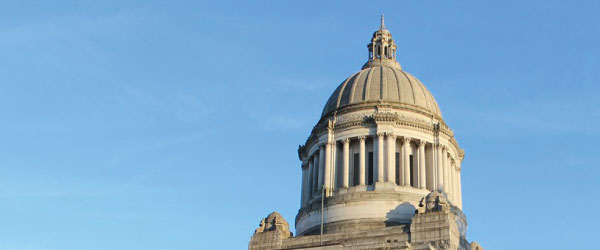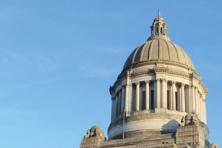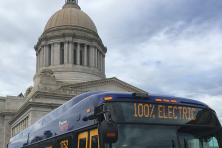So often we hear that taking urgent action on climate change is something we should do to safeguard our children and grandchildren’s future. And it’s true that it is—when I look at my small two-year-old daughter Rose, I worry about how the world will look when she’s my age. But the reality is, we have already locked in a changed climate, and for those of us who are millennials, scientists project that carbon dioxide concentrations will climb to over 700 parts per million in our lifetime, over three times pre-industrial levels.
So yes, climate change is about future generations, but in a much larger sense it is about people today and the world we will grow old in.
Those of us who keep our children inside for weeks every summer because the air is too dangerous for them to breathe, and worse still, for those who gather their families and flee for safety away from fast approaching wildfires.
That’s why at Climate Solutions, we’re so intensely proud of Washington’s achievements in the 2021 Legislative Session. The Climate Commitment Act, the Clean Fuel Standard, the HEAL Act and new policies to address natural gas pollution were all built around the simple idea that we can make things better. These hard-won efforts are motivated by the idea that tackling the climate crisis can help us create good jobs, it must advance the cause of racial justice, and it must begin to redress past harms and prevent future ones.
Washington will now invest billions of dollars into the clean energy transition.
- By 2037, over $5 billion will go to eliminating our reliance on oil—a historic investment in mass transit, bicycle and pedestrian infrastructure, and transportation electrification.
- Over $2.8 billion will go to communities burdened by pollution and climate change.
- More than $800 million will go to projects sponsored by tribal nations, and an additional $250 million will be allocated to relocating tribes threatened by sea level rise.
- Billions more will go to other carbon reduction projects, like building electrification, and climate resilience investments, like forest management initiatives to deal with the annual wildfires that threaten lives and livelihoods across our state.
All of this will be coupled with regulatory mechanisms that will provide a deep assurance of pollution reductions. With Washington finally adopting the Clean Fuel Standard, the Renewable Coast from the Yukon to the border with Mexico will require a gradual phase-out of gasoline and diesel—the largest sources of both climate and health pollution in our state. At the same time, the Climate Commitment Act will impose among the most ambitious economy-wide caps on greenhouse gas emissions in the world, coupled with new air quality monitoring and emission standards in overburdened communities.
In combination with our 100% clean electricity law, building efficiency standards, and zero emission vehicle mandate adopted in previous sessions, Washington has done more to commit to a fossil free future than any other place on the planet. We’re serious about this, and we’ll get the job done.
There is more work left to do. We opposed Governor Inslee’s veto of the tribal consultation section in the Climate Commitment Act. We owe a profound debt to tribal nations for so many reasons, and they were an essential part of the coalition that passed this law. We take the governor at his word that he’s committed to a robust discussion around tribal consultation policies. This provision or one like it must be reenacted, and we’re firmly committed to doing so next session. We’ll follow our tribal partners’ lead on this work.
Washington needs a new transportation package that honors our moral and legal obligation to tribal nations regarding fish passage; that makes substantial investments in the preservation and maintenance of our transportation system; and continues to invest in transit and non-car modes. On all of these issues, we’re committed to seeing this work through.
It was an honor of a lifetime to stand shoulder-to-shoulder with tribal nations, with Black Lives Matter and Build Back Black Alliance, with working people from the Sheet Metal Workers, the IBEW, SEIU, Washington Federation of State Employees and more. Fawn Sharp, the Vice President of the Quinault Indian Tribe, has been a national leader in the fight for a stable climate. Her unwavering commitment over the years was essential in achieving progress this year. We also owe a debt of gratitude to Leonard Forsman, Chairman of the Suquamish Tribe and President of the Affiliated Tribes of Northwest Indians, along with the other tribes that raised their voices and demanded action. Many other partners poured themselves into this work, including our friends at Washington Environmental Council, The Nature Conservancy, the Low Carbon Prosperity Institute, and so many other nonprofits, businesses, and individuals.
Representative Joe Fitzgibbon’s decade-long climate work yielded a policy we can be proud to implement and a House of Representatives ready to enact ambitious policies. Senators Reuven Carlyle and Rebecca Saldana navigated these policies through our state Senate for the first time, and incorporated essential environmental justice policies. And without Governor Inslee’s lifetime of dedication to climate action neither of these bills would have passed.
It’s important too to note how inadequate this list is. There was a time when the great civic monuments of humanity—the cathedrals, the pyramids, and more—took more than a lifetime to build. Architects and workers envisioned great achievements that they never lived to see. So many people over the years at Climate Solutions and beyond made outsized contributions to these policies and into building this movement. Many of them have moved on, but their names are on these wins. Tens of thousands of people across the state spoke up, contacted and pushed their elected officials to do more and keep going. It took every day of the last decade—every memo, email, action alert, meeting, yard sign and more—to make this possible.
It is an honor to stand with so many to definitively say—Washington will end its reliance on fossil fuels, we’ll clean our air and create a more widely shared prosperity. We’ll secure the safety and health of all our residents, and we’ll welcome the world to join us.
Washington will lead towards a net-zero, 100% clean energy economy.




